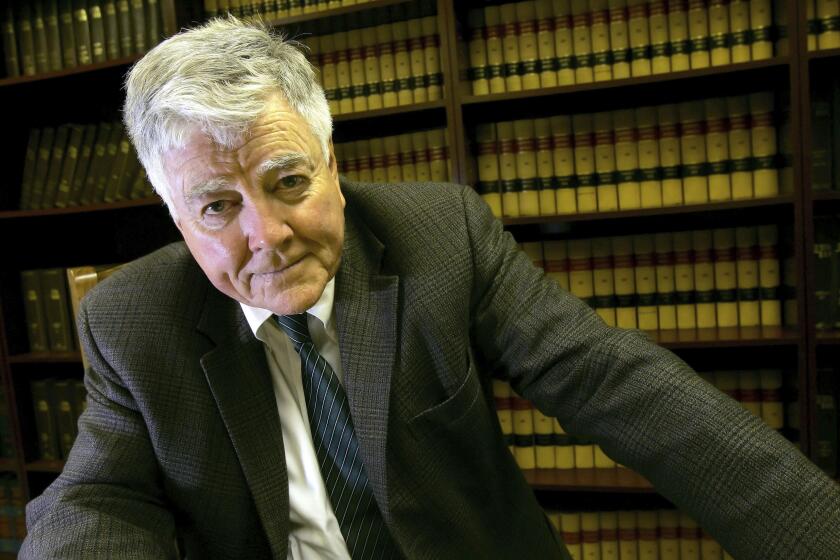Reported ‘Shogun’ Exit Darkens Politics
The last “shadow shogun” of Japanese politics, ailing former Prime Minister Noboru Takeshita, reportedly is retiring at age 76, setting the stage for a party power struggle here.
“It’s now going to be politics without a don,” said Kenji Goto, a Takeshita-watcher and senior writer at Kyodo News Service. “Personalities will be less visible in Japanese politics, and there is no system for developing new leaders.”
The son of a sake brewer, Takeshita is said to have mastered two quintessentially Japanese arts: the knack of getting people to do exactly what he wants without giving orders, and a talent for getting information while giving almost nothing away.
Takeshita had served as prime minister for less than 18 months when he was forced to resign over a scandal in 1989. But his real power was exercised behind the scenes, where for nearly two decades he reigned over the largest faction of the ruling Liberal Democratic Party, or LDP. From that perch he collected and dispensed favors and advice, steered public works projects and anointed prime ministers.
Though his health and political clout have been ebbing, Takeshita was a force to be reckoned with even from the Tokyo hospital where he has been confined for more than a year with what is described as a spinal ailment.
He allowed few visitors but was frequently consulted by telephone. From his hospital bed, he was said to have masterminded the coalition between the LDP and the New Komeito party, but he left all credit to his favorite protege, former Prime Minister Keizo Obuchi. The coalition has been a godsend to the weakened LDP, allowing the party to push through its legislation, notably economic reforms, with minimal concessions.
Now Obuchi lies in a coma after a stroke early this month. His successor, Prime Minister Yoshiro Mori, is the leader of a rival faction within the LDP. The power of Mori’s group is growing, and the now-leaderless faction left by Takeshita undoubtedly will lose influence, said political analyst Takayoshi Miyagawa.
All this, together with the retirement this week of another LDP heavyweight, Seiroku Kajiyama, 73, has created a power vacuum within Japan’s leadership. The inside politicking won’t have much effect on policy, analysts said, except that not much policy will get made until elections, expected to be held in late June.
Takeshita’s resignation is no surprise. Rumors of his ill health circulated at least a year before his hospitalization, and the dearth of medical detail has fueled suspicions. Still, until recently, supporters in his home district of Shimane, an LDP stronghold on the Sea of Japan, said their favorite son easily could win reelection from a wheelchair.
However, Takeshita now is not well enough to campaign even on wheels, according to Goto, the news service writer. Deeply shocked by Obuchi’s sudden collapse, Takeshita has heeded his own longtime advice: that a politician should know when to quit, Goto said.
According to every major Japanese media outlet, Takeshita has told LDP officials that he will not stand for reelection. Characteristically, the tight-lipped Takeshita has made no public statements.
He is said to want his half brother and political secretary, Wataru Takeshita, to run for his seat. But LDP insiders worry that an opposition candidate, Atsushi Nishikori, might score an upset, so there is talk of running Chief Cabinet Secretary Mikio Aoki for the seat instead, said independent political analyst Hiroshi Takaku.
Jockeying to succeed Obuchi as faction leader also is in full swing. The leading candidates are said to be Ryutaro Hashimoto, a former prime minister; Hiromu Nonaka, the LDP secretary-general; and Aoki.
The LDP, which has run Japan since 1955 except for a brief hiatus, has five major and two minor factions, along with a small group of unaffiliated members of parliament. The power of the faction bosses to distribute money and command obedience from members of parliament under their wing certainly has diminished, Takaku said.
But it is the faction leaders who still divide and distribute the spoils, notably the prime minister’s job and Cabinet posts. If the LDP wins as usual in June, Mori is expected to assume this prerogative, even though the public claims to be sick of such back-room political machinations.
“Japanese politics is changing more slowly, obviously, than the economy,” said political science professor Gerald Curtis of Columbia University. “The gap between public attitudes and political behavior is growing wider and wider. And the politicians’ response is to do more of what they know how to do, which reinforces the old ways of doing things.”
More to Read
Start your day right
Sign up for Essential California for news, features and recommendations from the L.A. Times and beyond in your inbox six days a week.
You may occasionally receive promotional content from the Los Angeles Times.






